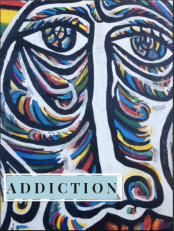|
by Ricardo M. de Ungria 
FIRST PRIZE: Ravana {Read}
 There is more to this simple, straightforward lyric than meets the sense. The poetic adrenalin gets to work quickly like a multifaceted diamond cutting into pieces the inherent contradictions in any agon worth dying for: desire and its futility, heroism and servility, brute strength and innate weakness, divine pleasure and human pain, movement and arrest, elusiveness of the real and realsomeness of the illusory, inner and outer shaking of foundations, the struggle with a god and the total lack of remorse for the attempt, affirmations and non-affirmations, fullness and power of will for the impossible venture and acceptance of the apotheosis of failure, singularity and grace of adoration and repeatability of resurrections after death. All framed within the context of a culture-specific myth, succinctly and lovingly meted out in chiseled, sensuous images in every line, whose linebreak swings out into a different angle of space and perception every time. Every true rebel who is also a true lawbreaker and true poet and lover is a Ravana with "twenty trembling hands" with which to execute his will into doomed action he would give his life over and over. Hieratic indeed, as with all human dealings with hidden gods. SECOND PRIZE: Groundmother Wouldn't Be The Last {Read}  Yes, Grandmother is just the beginning of everything and anything that reminds us “that heart / is not the only place where pain / visits like a ghost and leaves a thin trail / of loss like crumbs for birds / who will never return.” In some cultures like mine, the bitten tongue is linked to memory: it is a momentary excruciation that is at the same time an affirmation of one’s existence because the pain is a sign of being remembered by someone whose name one would then guess by thinking of a number and connecting it to the number of a letter in the alphabet—which letter should be the first one in the name of the culprit and bringer of “the taste of blood.” The bitten tongue will be a jolt on daily chores in front of the computer or during office meetings. In the poem, neatly structured as a sonata, the hurt and the anger, scooped up in the figure of the bitten tongue, “will eventually heal itself” and at the same time “ready itself for being bitten again.” But the readiness and easy availability and repeatability of the solution—“this blue jar of pale, / yellow sugar”—is the point of it all. THIRD PRIZE: Greasepaint {Read}  The short hyphen bars, used unpredictably and unDickinsonly in this poem, charm me more than anything. It adds character to the voice and balances that single passionate run-on sentence at the latter half of the poem. The empathy that the voice feels towards the undying vocation of the aging and ageless stage actor is so intimate and complete that its reflection of the other’s consciousness convinces and peels the melodrama off the pathos and sharpens it to a catch in the throat evoked by the bold unpunctuated break in thought between two separate moments yanked together in a single line: “and will grow into something” and “maybe someday comes.” It is one caesura as magnificent as a drum break in music. Images come tightly packed (“cow drenched field / with more stool than audience heads now” and “the row of ageing little parts rattle / in their spools”) early on and ease up only in the single stream of hopefulness in the one sentence of the latter half of the poem. Such deathlessness of habits (in all senses of the word) engendering its own continuity from some clear past into some pretty but unknown future—what intense passion that keeps the banner of forever close to its chest does not have this?
 FINALIST: Re-apparition {Read}  What is quietly fantastic and disquieting about this deceptively simple-looking and dark poem that begins with the mention of an unholy hour is that nothing in it could be real—except perhaps for the stairs “with dusty banisters,” the empty bird cage with its metal door squeaking in the wind, the “mountain of crushed beer cans” somewhere in a room, and the sparrows “fluttering by the windowsill.” But then, even these might not be “out there” at all, but mere shadows in the speaker’s consciousness—that “immediate void”—lost in a loop and warp of time. Inside that consciousness, what is clear is the raven that is no longer there (poor bird of premonitions and apparitions), and the sparrows that could be there as possible fair exchange for the black bird no longer there. This quick and ready-made compensation for a deep unforgettable loss is what I would think makes any quick fix soothe and stem for the nonce the perpetuum mobile of the unraveling of the unraveled.  FINALIST: Buru-sera {Read}  I like the surge of arousal and pleasure here essential to the theme of the contest, not to say the colorful transgressive quality and intensity of the fetishist experience. The bouquets of fetor and fermentations of the dead and the used-up are aleatoric sources of fertilities of the olfactory sense and the creative imagination. The occult pleasures of unverified and unauthorized smells in our youth stay with us, planting themselves in the deep recesses of our memories and grow like plastic alien mushrooms in that dark whose epiphanies could be “an orchestra” or “a surging forest” or a deer that “inhabits [the] left tear duct.” Whoever has not enjoyed—nor sought out—the recurrence of those forbidden and inexplicably unsanitary atoms loose in the air has not led a full life. FINALIST: Smoking a Pot of Gold {Read}  Don’t get me wrong. I have nothing against grandparents. But this is a second poem I have chosen with a grandparent at the center of it. This time from the point of view of an uninvolved spectator—a grandchild—getting the drift of the theme of the contest from a conversation he overhears between his mother and his aunt. Many were the poems submitted that spoke angrily from the point of view of witness or spectator to the downward spiral of the user. But this one is different. It is set up like the beginning of a novel—with many things left unsaid like shadows cast by image-stakes driven quickly into the ground for further expansion perhaps into a palace of a kind later. What are these stakes? The grandfather being the father of the narrator’s father. The grandfather being a doctor who became his own patient. The white horse he rode on and the opium balls smoked black. The helplessness of the grandfather and the fear the grandchildren have of him. The gossiping and the washing of clothes by the mother and her sister. The fish sauce barrels where the opium balls were kept and the washing tub. The dirty clothes and the black opium balls. The worth of the opium balls in gold and the poverty of the family. The wheeze the grandfather makes and the swish of clothes in the tub. The wet clothes and the grandfather’s dry cough. The thrill of divine smoke and the unwanted dregs of the real cough it left behind. And above all, with a touch of chill, if one remembers: the child speaker left standing before the still closed doors of perception, and the birth of wonder in his young mystified mind.
|